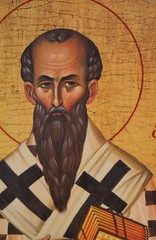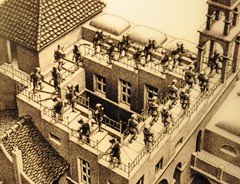
From the beginning of Great Lent this year I have been framing the Great Lenten experience as a journey. I mentioned Israel’s departure from Egypt into the desert as a model for our own journey into Great Lent. And today the Gospel reading reminds us that the journey of Great Lent takes us to other destinations even to Jerusalem, not the heavenly one, but the city in which Christ will be crucified. As Mark 10:32-33 reports:
Now they were on the road, going up to Jerusalem, and Jesus was going before them; and they were amazed. And as they followed they were afraid.
We might imagine many reasons why the disciples were both amazed and afraid as they follow Jesus, the text only tells of their spiritual and emotional state without giving us an explanation as to why. They are clearly walking behind Jesus, who is leading them to Jerusalem where he tells them He is going to be killed. But we don’t know if they follow reluctantly or are trying to slow their journey down. We know there will be a surprising welcome for Jesus in Jerusalem on Palm Sunday, and no doubt that gave the Disciples a moment to hope that maybe things would not be as a bad as they feared.

In one of the hymns we sing from Monday of Holy Week, we are given an interpretation of this Gospel lesson in which we ourselves participate in the events.
AS THE LORD WAS GOING TO HIS VOLUNTARY PASSION, HE SAID TO THE APOSTLES ON THE WAY, BEHOLD, WE GO UP TO JERUSALEM, AND THE SON OF MAN SHALL BE DELIVERED UP, AS IT IS WRITTEN OF HIM. COME, THEREFORE, LET US ALSO GO WITH HIM, PURIFIED IN MIND. LET US BE CRUCIFIED WITH HIM AND DIE THROUGH HIM TO THE PLEASURES OF THIS LIFE. THEN WE SHALL LIVE WITH HIM AND HEAR HIM SAY: I GO NO MORE TO THE EARTHLY JERUSALEM TO SUFFER, BUT TO MY FATHER AND YOUR FATHER, TO MY GOD AND YOUR GOD. I SHALL RAISE YOU UP TO THE JERUSALEM ON HIGH IN THE KINGDOM OF HEAVEN.
Like the Twelve Disciples, we too might both be amazed and afraid when we consider that we are going to Jerusalem not to watch Christ die for us but rather so that we might die with Christ. We are going there in the words of St Paul to have the world be crucified to us and ourselves to the world (Galatians 6:14). Crucifixion even if it is intended to mean spiritually crucified, still means death, which should give us pause and cause us to cringe at the thought that to follow Christ means we must choose to die with Him.
We Christians do not come to Holy Week to be spectators watching a passion play unfold like a nicely done drama, we are here to die with Christ. The annoying inconveniences of the Great Fast were reminding us that death involves the body and the soul.
St. Paul says in Romans 5:6-8 –
While we were still weak, at the right time Christ died for the ungodly. Why, one will hardly die for a righteous man—though perhaps for a good man one will dare even to die. But God shows his love for us in that while we were yet sinners Christ died for us.

Indeed He died for us, the sinners, but not so that we could enjoy a passion play each year, but so that we too would die to sin, die to the world, die to ourselves, so that we might live with Him.
Our Lenten sojourn takes us like the Israelites out of the great Egyptian empire into the desert to encounter our God free of the distractions and temptations of civilization. In the desert we are able to free our minds of all the cultural and nationalistic ideas about God – the One who has unlimited power sending forth His invincible armies, or the One who destroys His enemies in the eternal fires of hell, or the One and pours out unending abundance upon His people. In the desert where there are no comforts of civilization to prop up these ideas of God, we are freed of our false images of God so we can encounter the God of love who humbly dies on the cross for sinners. Not only is He nailed to the cross and executed like a common criminal, He invites us to share in His death! We are to die to the world in order to live with Christ.
The Lenten sojourn, however, doesn’t keep us in the desert but rather the desert is the way to Jerusalem, where Christ is crucified. We don’t like this idea of a crucified, suffering Lord any better than the Twelve did. We like them don’t want to go to that Jeruusalem in which God is crucified. We want the triumphant Jerusalem where God reigns in power from on high, not nailed to a cross. We prefer not to think about it. We prefer victory, triumph, blessings and glory, but the Way who is Christ is through the Cross. Through the Cross joy comes into all the world.

If we want to follow Christ, we have to listen to what the Lord Jesus actually taught, and then we will know our life will not be one of being served and pampered or of having all our needs met or of having all our prayers instantly answered, but rather our life in Christ will be one of constantly looking in love to serve others, which means we each have to practice self-denial and put others ahead of our self. Lent tries to free our minds from the images we receive from the culture about God and to encounter the God who is revealed dying on the cross. For example, America does give us an image of God and it usually is an image of prosperity and power as in “God bless America”, but the Gospel calls us to see the God revealed in the Scriptures. The God who humbles Himself and dies on the cross for all sinners.
We should be able to discern that the images of God which are shaped by the culture are often distorted and serve the purpose of the culture.
Thomas Merton once commented about the monastic movement of the 4th Century which started as a reaction not against pagan culture but against imperial, prosperous Christianity. The men and women who fled the conveniences and comforts of the Roman Empire also moved into the desert, in imitation of Israel of old, in order to find God who was not subverted by the state nor subservient to the state.

“Society … was regarded by them as a shipwreck from which each single individual man had to swim for his life. . . . These were men who believed that to let oneself drift along, passively accepting the tenets and values of what they knew as society, was purely and simply a disaster. The fact that the Emperor was now Christian and that the ‘world’ was coming to know the Cross as a sign of temporal power only strengthened them in their resolve. . . . The simple men who lived their lives out to a good old age among the rocks and sands only did so because they had come into the desert to be themselves, their ordinary selves, and to forget a world that divided them from themselves. There can be no other valid reason for seeking solitude or for leaving the world. And thus to leave, the world, is in fact, to help save it in saving oneself. This is the final point, and it is an important one. The Coptic hermits who left the world as though escaping from a wreck, did not merely intend to save themselves. They knew that they were helpless to do any good for others as long as they floundered about in the wreckage. But once they got a foothold on solid ground, things were different. Then they had not only the power but even the obligation to pull the whole world to safety after them. . . . We cannot do exactly what they did. But we must be as thorough and as ruthless in our determination to break all spiritual chains, and cast off the domination of alien compulsions, to find our true selves, to discover and develop our inalienable spiritual liberty and use it to build, on earth, the Kingdom of God.” (Thomas Merton)
The call to leave Egypt, civilization, the greatest nation on earth, and go into the desert (Great Lent) reveals to us the nature of civilization itself. Culture wants to shape us into its own ideal about what it is to be human or Christian, and into people who are willing to serve the needs of the culture, and to enslave themselves to it. Nations want us to accept their nationalistic ideas of God, so that God too serves the goals of the nation. This is why the desert fathers thought the society was a shipwreck and the only way to find their true self, the self which God intended each of us to be, was to separate themselves from all of the benefits, temptations and allurements of society. It is only when we get a new perspective and aren’t totally immersed in or dependent on our culture that we come to understand the Gospel of Christ, not the Gospel mediated by the culture. Republicans and Democrats both think they know best what the Gospel really means. We as Christians need to hear Christ, not what others say about Him. An example of this is to think about Christ’s words to “love your enemies” (Luke 6:27, 35). Christ’s words are simple and straightforward, but our culture will do its best to explain away the most straightforward meaning so that the words are practical, doable, sensible and reasonable and made to justify and serve the values of the culture. But the cultural understanding and explanation is not necessarily the one offered by Christ in the Gospel.

Some years ago, I read the book A STRANGER TO MYSELF: THE INHUMANITY OF WAR, in which a young German man describes how he was shaped from what he was, a youthful German citizen into a cog of the Nazi war machine. He was brutalized in order that he would be brutal – dehumanized so that he would be inhuman for the benefit of the Third Reich. He indeed became a stranger to himself, and not only to himself but lost all feeling for the people around him whom he no longer saw as humans. He was willing to serve the war machine no matter what it did to himself or to others. He did what he needed to do to survive in that state. He became the person the state needed him to be for the state to attain its goals. He tried to save himself by adapting to what the state demanded of him, but in this process he lost his soul and lost any shred of humanity. His story is exactly what the monks feared was happening to themselves even as the Roman empire became Christian – the Empire told them it was OK to be Christian, but only to be Christian to the extent and in the way that the Empire approved in order that they be the kind of citizens that benefited the Empire.
Great Lent challenges us to think like the desert fathers thought as they contemplated the empire they lived in. They had to ask themselves if they could in fact be Christian if they limited themselves to what the “Christian” Empire defined and approved? They asked themselves whether being a Christian simply meant serving the Roman Empire, or did they have allegiance only to the Kingdom not of this world? They were in the world but not of it (John 17:11-16). They questioned whether accepting the protection and Lordship of Caesar meant that they no longer lived under the sole protection and Lordship of God. They had to find a way to remember the self-sacrificing love of Christ rather than see love as self-serving or a way to benefit the empire’s insatiable needs.

These are the same questions we need to ask ourselves. We still live in the same world that the apostles and desert fathers lived in. Many like to think about America as being a Christian nation, but does that serve the Kingdom of Heaven or does it mostly serve the goals of America? Some might say but it’s not an either or, why can’t it be both?
And then we hear the Gospel: “No one can serve two masters; for either he will hate the one and love the other, or he will be devoted to the one and despise the other. You cannot serve God and mammon.” (Matthew 6:24)
It is because of the Gospel that the Roman Government persecuted the Christians, the Muslims persecuted the Christians, and the communists persecuted the Christians. All of these governments heard the Gospel as a challenge to their authority and power. And the Christians did not work to overthrow those governments, rather they chose to live as lights to the Kingdom of God in the midst of the world. No wonder the disciples were afraid as they followed Christ into Jerusalem. They accepted Jesus as Lord, but were walking into a City in which Caesar and Herod both laid claim to that title, and the religious authorities were beholden to Rome and Herod for maintaining their own positions.
It is not only the state that wants us to temper the Gospel to meet the goals of the state. Our own self-interest can demand that we make the Gospel subservient to our own personal interests.

John and James ask of Jesus: “Teacher, we want You to do for us whatever we ask.” Isn’t that so like us and how we pray and approach God? God give me what I want, what I demand, what I lust for, what I think I’m entitled to. Be my servant God, do my bidding and do it now. We make ourselves our own Lord and Master and demand that God serve us.
We convince ourselves that discipleship, faithfulness to Christ, certainly will be rewarded in this world not just in the world to come. Christ reminds us of the cross, that He came to serve, not be served, and we are supposed to imitate Him.
And when we realize that Jesus tells us that to follow Him means to love one another, to deny the self, to die for Christ, then we might decide like Peter that we want to follow Christ but only at a safe distance: Then they seized Jesus and led him away, bringing him into the high priest’s house. Peter followed at a distance … (Luke 22:54)

Or we might decide that we really want to live for Christ, with Christ and in Christ. And that will help put all other values and blessings in perspective, and we will live by and for the eternal Kingdom of God.







 “This image of interior cleansing through the water of humility is mirrored in the encounter between Christ and fallen woman recorded in Luke’s Gospel, in which she approaches Christ from behind as he is dining with the Pharisee and washes his feet with her tears and wipes them with her hair (
“This image of interior cleansing through the water of humility is mirrored in the encounter between Christ and fallen woman recorded in Luke’s Gospel, in which she approaches Christ from behind as he is dining with the Pharisee and washes his feet with her tears and wipes them with her hair ( The unnamed woman of St. Luke’s Gospel, in all her brokenness and sorrow, already has learned the lesson Christ is teaching his disciples. Her humble repentance, driven by great love, has brought her to the feet of Christ. Like St. Peter, she does not hold back. Her tears of repentance, flowing as living water (Jn. 7:38), wash the feet of One who needs not cleansing but who nonetheless welcomes her with joy.” (Daniel B. Hinshaw,
The unnamed woman of St. Luke’s Gospel, in all her brokenness and sorrow, already has learned the lesson Christ is teaching his disciples. Her humble repentance, driven by great love, has brought her to the feet of Christ. Like St. Peter, she does not hold back. Her tears of repentance, flowing as living water (Jn. 7:38), wash the feet of One who needs not cleansing but who nonetheless welcomes her with joy.” (Daniel B. Hinshaw, 












 “’Fasts and vigils, the study of Scripture, renouncing possessions and everything worldly are not in themselves perfection, as we have said; they are its tools. For perfection is not to be found in them; it is acquired through them. It is useless, therefore, to boast of our fasting, vigils, poverty, and reading of Scripture when we have not achieved the love of God and our fellow men. Whoever has achieved love has God within himself and his intellect is always with God.’” (
“’Fasts and vigils, the study of Scripture, renouncing possessions and everything worldly are not in themselves perfection, as we have said; they are its tools. For perfection is not to be found in them; it is acquired through them. It is useless, therefore, to boast of our fasting, vigils, poverty, and reading of Scripture when we have not achieved the love of God and our fellow men. Whoever has achieved love has God within himself and his intellect is always with God.’” (







